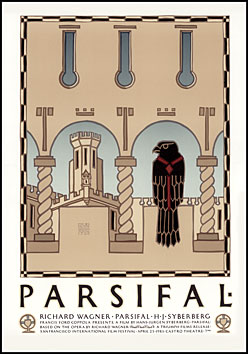
Click on image for detail
(#102) PARSIFAL:
Edition of 2965 of which 300 are signed 1-300, 26 are signed A-Z as artist's proofs, and 3 sets are signed as progressives.
April 14, 1983
8 colors 16-3/4" x 24"
Influence: Carl Otto Czeschka (Austrian, 1878 - 1960)
Client:
George Gund III for The San Francisco Film Festival.
1-300: Saint Hieronymus Press, Inc. A-Z: artist's
own use.
Progressives:
1 set to George Gund III, 2 sets to Saint Hieronymus
Press, Inc.
(Communication Arts 83 Design Annual)
The quest for the Holy Grail can be undertaken with any hope of success only by the pure in mind, body and heart. Lancelot, the best knight in the world, was disqualified because of his carnal love for Guenevere. Perceval didn't love anybody or anything, except his own purity. His strength was as the strength of ten because his heart was pure, and whenever he found himself in danger of becoming impure he was saved by some simple act of faith. Fiends burst like sausages all around him as soon as he made the sign of the cross, which he always did just in the nick of time. He was, in fact, too pure for the mundane altogether, and after attaining the object of his quest, passed out of this world without even bothering to die.
Perceval was pure the way an animal is pure: without thought, without evil intent, without lust, avarice or envy. He was pure because he knew no better. Purity exists by comparison with the impure, the flawed, the crooked and imperfect. Purity creates an impossible standard, both for the pure and the world in which the pure resides. Perceval was impossibly pure, and went out of his way to display an arrogant, aggressive purity that drove people crazy.
The pure person is never happy, and finds
satisfaction only if he is better than someone
else, or if someone or something obliges him
by failing. Life was a series of rejections,
either by Perceval of something or someone, or
by them of him. Sooner or later, something, somewhere,
will go wrong with every friend or acquaintance, every
possession or pursuit, and that will be the end of that.
Perceval was perfect. Everything he did, he did to perfection
and without apparent effort. He was the best, bar none,
at every undertaking. But nothing satisfied him, and
he had to keep moving. What must it have cost to be so
perfect? Everything, is what it cost. There was nothing
left to spare. He had no lover, no home, no children,
no means of sustenance. He took what he needed, as no
more than his due, and moved on.
When the pure and perfect man gives praise, it may be that he is trying with all his might to overcome his basic dissatisfaction, trying to root out the unhappiness. Trying to trick himself. But, ultimately, failing. When the pure and perfect man condemns, he does so without passion, knowing that failure is all he can possibly expect from anything or anyone.
The world is not perfect, and Perceval threw out everything that wasn't perfect until nothing was left. "Ending is better than mending," is purity all over. It could have been his motto, engraved on his shield. It's not that he was impatient, it's just that at one point or another, things simply were not worth trying to fix. It's easier, cheaper and faster--not to mention less challenging or demanding--to throw away the old thing and simply get a new one. When the new one fails in turn, out it goes and another replaces it. Sooner or later, everything fails and even though he expected nothing else, this betrayal hurt and more in sorrow than in anger he picked himself up and started over and left the failed thing in the dust.
Perceval did not mend, fix or maintain. Perceval did not love or hate. He had no hopes, no dreams and no wish but to fulfill his destiny, over which he neither had nor desired any control. But, Perceval got something that nobody else could get: he spent his whole life looking for something that did not exist, and he found it.
A person who aims at something no one else can see and hits it. -- Definition of a genius, Harry Dov Weininger, March 6, 1997